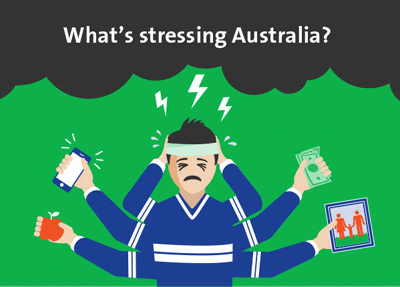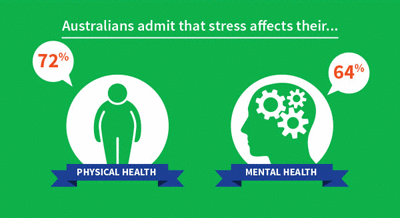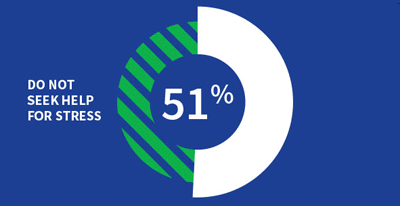Stress and Australians
Numbers released by the Australian Bureau of Statistics show that Australians are stressing more than ever. With this in mind, WayAhead has teamed up with “Compare the Market” to produce an easy to understand infographic that shows what is making us stressed and how we are dealing with it.

While everyone acknowledges they get stressed from time to time, it is not well known that stress can have detrimental effects on both your physical and mental health. People are often particularly reluctant to admit that the stresses of life are affecting their mental wellbeing and seek help for it.
View our Recognising and Managing Stress Fact Sheet
75% of Australians surveyed admitted that stress in their lives adversely affected their physical health, while only 64% said it affected their mental health. “Sometimes people are hesitant to acknowledge their mental health is affected by stress” says Mehna Alacozy from WayAhead. “In fact, people often say that stress affects them physically more than mentally.”

But our mental health is affected by stress.
According to a study into stress and wellbeing run by the Australian Psychological Society (APS) in 2014, almost two in five Australians reported experiencing at least some symptoms of depression, with 13% of these Australians reporting symptoms in the severe to extremely severe range. On top of this, more than one quarter of Australians reported experiencing at least some anxiety symptoms, with 13% of these Australians reporting severe to extremely severe levels of anxiety.
Financial concerns seem to have been the largest contributor to stress within Australia over the past few years with 45% of participants saying that this was their primary concern. Of this group, a huge 58% felt that pressure to afford basic food and necessities was causing them undue stress and concern.
So how are we dealing with this stress as a nation?
Well, according to the statistics, 86% of us watch TV and movies, closely followed by 81% of us who spend time with our loved ones. Other coping mechanisms include; focusing on the positives, listening to music, reading, eating and adjusting our expectations.
Alarmingly, when it comes to asking for help, over half of us fail to do so.
Of those that are willing to ask, just over a quarter will seek help from family members and friends, whereas 19% will consult a GP and under 10% would be willing to ask a psychologist.

At WayAhead we have a number of “Stress Less Tips” that provide useful suggestions for coping with the stresses of everyday life. However, according to the APS, “if levels of stress continue for a long period of time, or are interfering with you enjoying a healthy life, it is advisable for you to seek professional help.”
Despite all this, it is important to remember that stress is a normal human emotion. As Mehna says, “stress is healthy! It helps us perform at our best, even if it makes us feel a little anxious sometimes.”
If you are concerned about your mental health you can contact WayAhead’s Mental Health Information Line on 1300 794 991 or speak to your medical professional.
Recognising and Managing Stress Fact Sheet
Newsletter
Stay up to date
Sign up to our Mind Reader newsletter for monthly mental health news, information and updates.